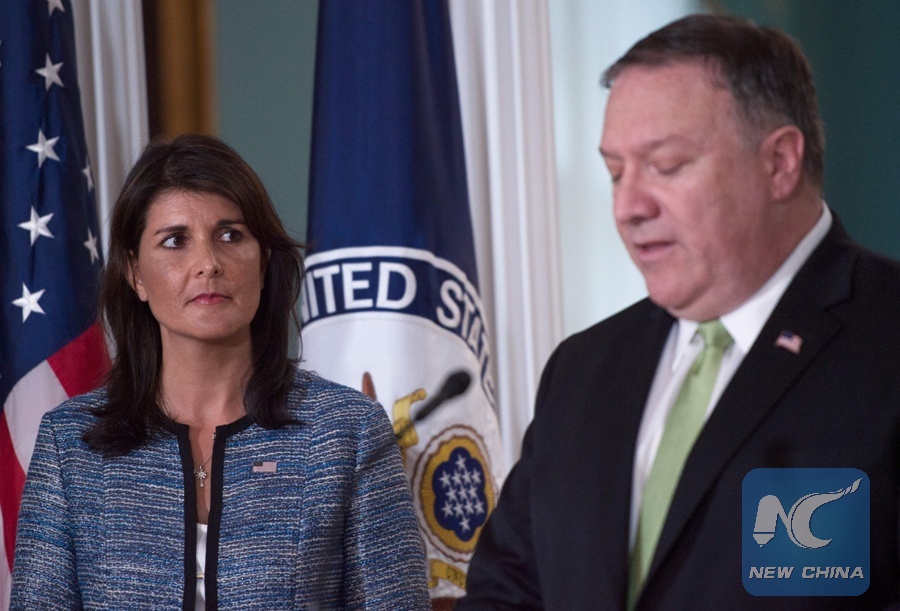
U.S. Secretary of State Mike Pompeo speaks as U.S. Permanent Representative to the United Nations Nikki Haley looks on at the U.S. Department of State in Washington D.C. on June 19, 2018. (Xinhua/AFP)
by Zhu Dongyang, Liu Chen
WASHINGTON, June 19 (Xinhua) -- Despite wide criticism, the United States is withdrawing from the UN Human Rights Council (HRC), U.S. Permanent Representative to the United Nations Nikki Haley said here on Tuesday.
U.S. IS LEAVING
In a speech at the State Department, Haley said the HRC had failed to conduct the "major, dramatic and systematic changes" required by the United States.
Saying the council is a "hypocritical and self-serving organization" and "a protector of human rights abusers and a cesspool of political bias," she said it has rendered membership to unworthy nations and harbored "disproportionate focus and unending hostility towards Israel."
"As we said we would do a year ago, if we did not see any progress, the United States is officially withdrawing from the UN Human Rights Council," she said. "The council ceases to be worthy of its name."
She also complained about many nations' blockage against the U.S. reform initiative and the unwillingness of those "like-minded" members sharing the U.S. values to "challenge the status quo."
However, she added that Washington will continue to advocate the council's reform, and "should it become reformed, we would be happy to rejoin."
Haley said last year that the United States would leave the council over what she said the "bias" against Israel.
UN CRITICISMS
UN Secretary-General Antonio Guterres regretted the withdrawal.
"The secretary-general would have much preferred for the United States to remain in the Human Rights Council," said Stephane Dujarric, Guterres' spokesman, in a note to correspondents. "The UN's Human Rights architecture plays a very important role in the promotion and protection of human rights worldwide."
Vojislav Suc, the president of the UN Human Rights Council, also said that it is essential to uphold a strong and vibrant council in times when the value and strength of multilateralism and human rights are being challenged on a daily basis.
In a statement issued right after Haley's announcement, Suc said the council should be recognized as a central part of the United Nations for the 21st century, and it is the prerogative of any member state to make such a decision.
The matter of filling the vacancy left in the council membership after the U.S. withdrawal will need to be addressed by the United Nations General Assembly, he added.
The UN High Commissioner for Human Rights Zeid Ra'ad Al Hussein also responded by saying that the U.S. withdrawal is "disappointing, if not really surprising."
"Given the state of human rights in today's world, the U.S. should be stepping up, not stepping back," Zeid said.
U.S. UNILATERALISM
The exit represented another U.S. departure from multinational organizations and treaties, after it pulled out of the Paris climate accord, the UN Global Compact on Migration, the UN culture and education body UNESCO, as well as the Iran nuclear deal.
"But the issues go deeper. The HRC, like the UN General Assembly, has ... recently publicly condemned the Trump administration's current border enforcement policy," said Trisko Darden, a professor at American University's School of International Service.
The issue "is indicative of a trend of criticizing the United States," he told Xinhua, adding the decision to leave "is likely to be widely criticized both domestically and internationally ... It may have significant implications for the structure and funding of UN institutions."
Christopher Galdieri, assistant professor at Saint Anselm College, told Xinhua that the withdrawal is "a convergence" of "a longstanding antipathy toward the UN generally on the American right" and "Trump's view that international relations should be transactional and benefit the U.S."
"This is one more action that will have the long-term effect of isolating the U.S. from its allies and other nations," he said. "I don't know that many in this administration care for international norms and rules in the first place."
(Matthew Rusling from Washington also contributed to the report.)

